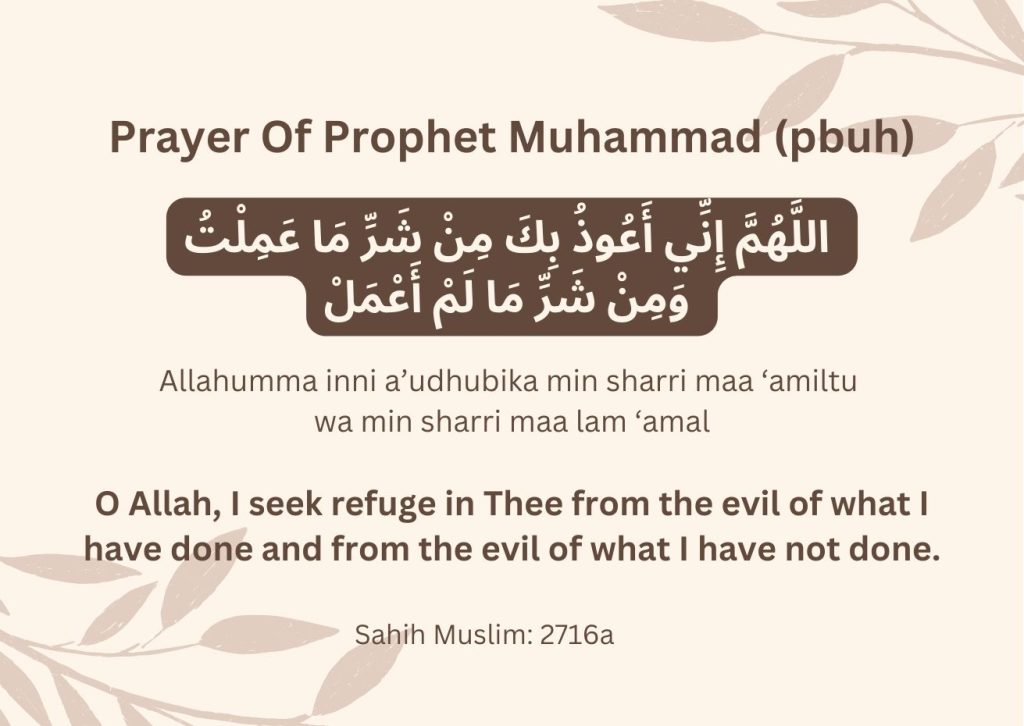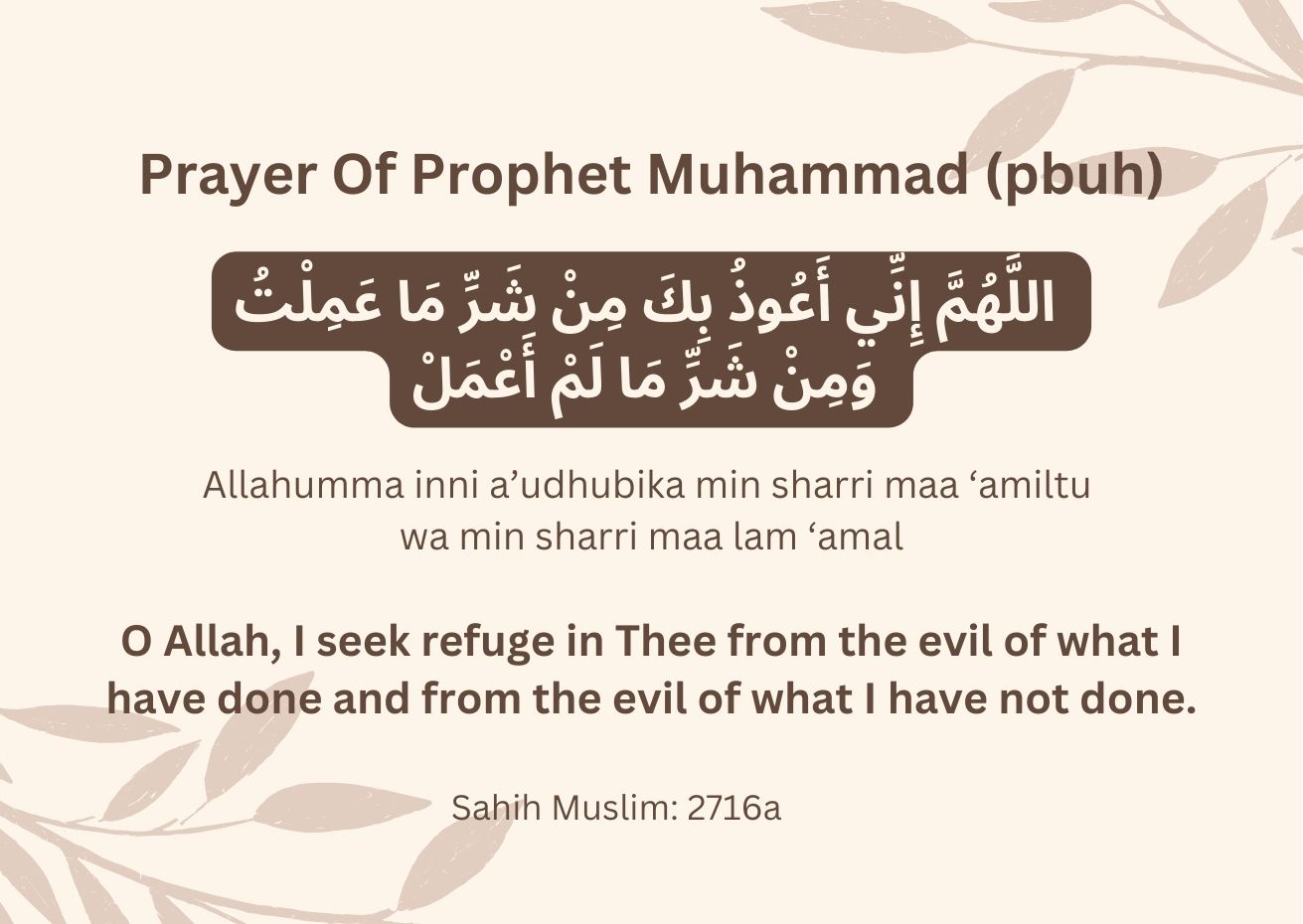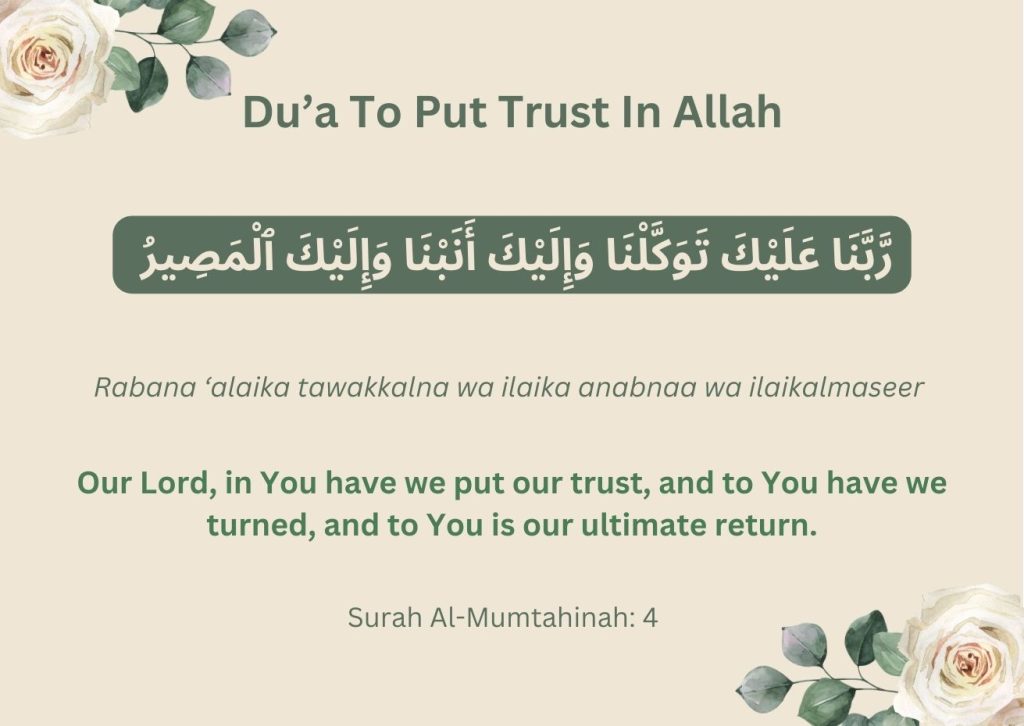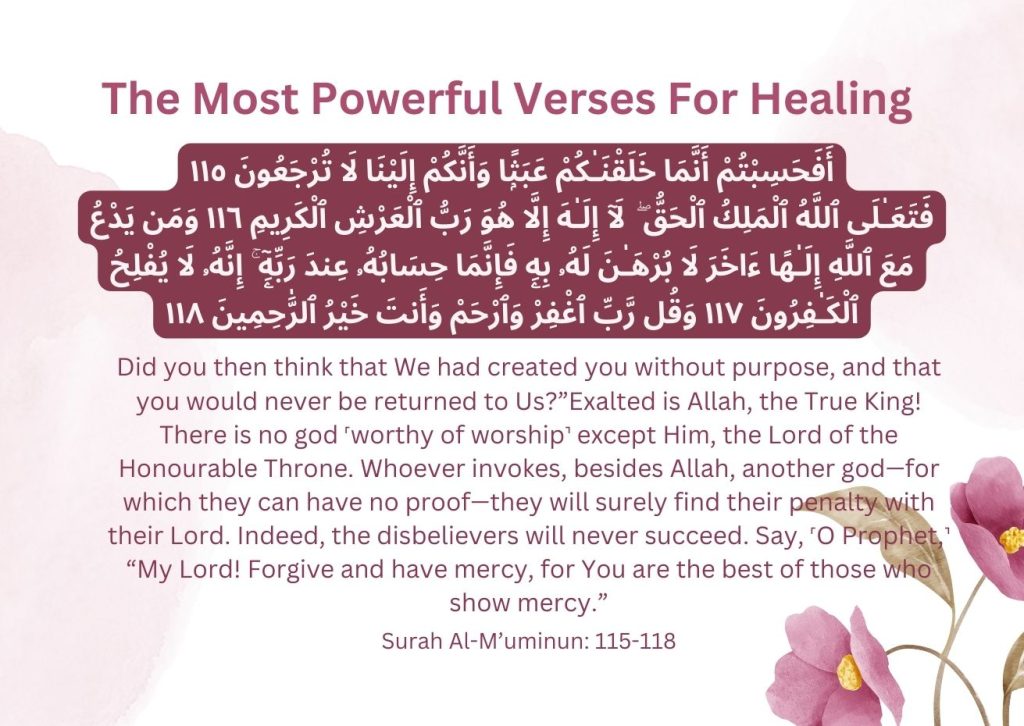
Introduction of prayer:
This is the prayer of the Holy Prophet Muhammad (pbuh). Once Sayyidah A’ishah (RA) was asked about the prayer Sayyidna Muhammad (pbuh) used to supplicate, she answered by this Hadith;
عَنْ فَرْوَةَ بْنِ نَوْفَلٍ، قَالَ سَأَلْتُ عَائِشَةَ عَنْ دُعَاءٍ، كَانَ يَدْعُو بِهِ رَسُولُ اللَّهِ ـ صلى الله عليه وسلم ـ فَقَالَتْ كَانَ يَقُولُ “ اللَّهُمَّ إِنِّي أَعُوذُ بِكَ مِنْ شَرِّ مَا عَمِلْتُ وَمِنْ شَرِّ مَا لَمْ أَعْمَلْ ” .
It was narrated that Farwah bin Nawfal said:
“I asked ‘Aishah about a supplication that the Messenger of Allah (saas) used to say. She said that he used to say: ‘Allahumma inni a’udhu bika min sharri ma ‘amiltu, wa min sharri ma lam a’mal (O Allah, I seek refuge with You from the evil of that which I have done and the evil of that which I have not done).'”(Muslim: 2716)
Exposition & virtues of prayer:
1- اللَّهُمَّ إِنِّي أَعُوذُ بِكَ مِنْ شَرِّ مَا عَمِلْتُ
O Allah, I seek refuge with You from the evil of that which I have done.
The Prophet Muhammad (pbuh) taught the Muslims to seek refuge from the evil of all actions, done or not done. All our actions affect ourselves and others as well. In Islam, the object of niyyah or intention is more important than the action itself. That’s why we see in the Qur’an, in Surah Al-Ma’un, Allah Kareem warns with destruction to those who pray Salah but they are not mindful of it. (Al-Ma’un: 4-6)
On the other hand, we see Sayyidna Ibrahim (as) after building Baitullah, he supplicated with great humble to Allah Kareem to accept their deed;
وَإِذْ يَرْفَعُ إِبْرَٰهِـۧمُ ٱلْقَوَاعِدَ مِنَ ٱلْبَيْتِ وَإِسْمَـٰعِيلُ رَبَّنَا تَقَبَّلْ مِنَّآ ۖ إِنَّكَ أَنتَ ٱلسَّمِيعُ ٱلْعَلِيمُ
And remember Abraham and Isma’il raised the foundations of the House (With this prayer): “Our Lord! Accept (this service) from us: For Thou art the All-Hearing, the All-knowing. (2: 127)
The Prophet Muhammad (pbuh) taught in this prayer that all our actions, even if they are righteous, need the acceptance of Allah. So, He (pbuh) used to seek refuge from the evil of all actions. He (pbuh) also used to pray to seek refuge from the bad actions and evils of the soul before delivering his sermon. Imam Ibn Majah reports from the Prophet (pbuh);
عَنِ ابْنِ عَبَّاسٍ، أَنَّ النَّبِيَّ ـ صلى الله عليه وسلم ـ قَالَ “ الْحَمْدُ لِلَّهِ نَحْمَدُهُ وَنَسْتَعِينُهُ وَنَعُوذُ بِاللَّهِ مِنْ شُرُورِ أَنْفُسِنَا وَمِنْ سَيِّئَاتِ أَعْمَالِنَا مَنْ يَهْدِهِ اللَّهُ فَلاَ مُضِلَّ لَهُ وَمَنْ يُضْلِلْ فَلاَ هَادِيَ لَهُ وَأَشْهَدُ أَنْ لاَ إِلَهَ إِلاَّ اللَّهُ وَحْدَهُ لاَ شَرِيكَ لَهُ وَأَنَّ مُحَمَّدًا عَبْدُهُ وَرَسُولُهُ . أَمَّا بَعْدُ
It was narrated from Ibn `Abbas that:
The Prophet (ﷺ) said: Praise is to Allah, we praise Him and we seek His help. We seek refuge with Allah from the evil of our own souls and from our bad deeds, Whomsoever Allah guides will never be led astray; and whoever is led astray, no one can guide. I bear witness that none has the right to be worshiped but Allah, alone with no partner or associate, and that Muhammad is His slave and His Messenger. To proceed) (Ibn Majah: 1893)
Sayyidna Muhammad (pbuh) also used to taught the prayer;
أَعُوذُ بِكَ مِنْ شَرِّ مَا صَنَعْتُ
O Allah, I seek Your refuge from the evil of my actions. (Sahih Al-Bukhari: 6306)
2- وَمِنْ شَرِّ مَا لَمْ أَعْمَلْ
And the evil of that which I have not done.
In the second part of the prayer the Prophet (pbuh) seeks refuge from Allah for the actions are not done by him.
It looks strange to seek refuge from the deeds that are not even done yet. But when we analyse deeply, we see that human action is comprised of two objects; intention and action. First we think about something and then act upon it accordingly. The Prophet (pbuh) sought refuge even from the evil of thinking.
This is the unique gift of ‘Laila tul Mi’raj’ (The Night Journey) of Prophet Muhammad (pbuh) that any believer who intends to do a good thing but does not do it will be rewarded with one good deed. And who intends to do a bad deed but does not do it, will not be recorded for him.
وَمَنْ هَمَّ بِحَسَنَةٍ فَلَمْ يَعْمَلْهَا كُتِبَتْ لَهُ حَسَنَةً فَإِنْ عَمِلَهَا كُتِبَتْ لَهُ عَشْرًا وَمَنْ هَمَّ بِسَيِّئَةٍ فَلَمْ يَعْمَلْهَا لَمْ تُكْتَبْ شَيْئًا فَإِنْ عَمِلَهَا كُتِبَتْ سَيِّئَةً وَاحِدَةً
He who intends to do a good deed and does not do it will have a good deed recorded for him; and if he does it, it will be recorded for him as ten; whereas he who intends to do an evil deed and does not do, it will not be recorded for him; and if he does it, only one evil deed will be recorded. (Sahih Muslim: 162)
When this prayer should be recited?
This short and beautiful prayer should be recited daily in the morning and the evening Azkar.



